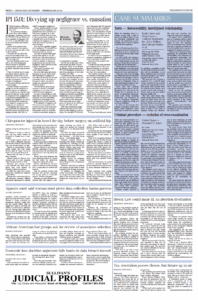Last year’s abortion law acts as a budget hurdle this year

The Chicago Daily Law Bulletin published this piece in print on Wednesday, May 30, 2018. The jump is below.
Published by the Chicago Daily Law Bulletin on May 30, 2018
By Rebecca Anzel
Law Bulletin correspondent
SPRINGFIELD — A controversial law enacted last year allowing tax dollars to be used on abortion procedures could imperil votes on this year’s state budget, which lawmakers have until Thursday to approve.
Eleven state representatives from both parties Tuesday said their “moral convictions” could cause them to turn down a compromise on a spending plan if it includes funding for the program created under House Bill 40. The bill became Public Act 100-583 in September after it was signed into law by Gov. Bruce Rauner.
“The fact that we’re forcing taxpayers to pay for this in spite of all of our other budgetary priorities is something that we wanted to raise attention to,” Palatine Republican Thomas Morrison said at a press conference. “Many of us ask that we just separate this budget into silos so that those of us who have a moral objection to this part of the budget would have the ability to vote it down so that we could stand for our constituents and we can stand for what we believe is right.”
The group raised the issue with House leadership several weeks ago, he said, and so far has not received a definitive answer on whether it will be addressed.
Rep. Jeanne Ives, a Republican from Wheaton who launched an unsuccessful primary challenge against Rauner based largely on House Bill 40, offered a few options for how to potentially avoid another year without a full budget. Illinois went without a budget for nearly two years from 2015 to 2017.
One would be to split Medicaid reimbursements for abortion procedures from the main budget measure, allowing legislators to vote for a budget and consider whether to fund Public Act 100-583 as separate issues. A cap for how much money could be spent on the program could also be implemented.
And language known in federal law as the Hyde Amendment could be added into the budget. Named for former U.S. Rep. Henry Hyde, a west-suburban Republican, the provision was first used in 1976 to bar federal funds from being used toward abortion except in cases of rape, incest or threat to a woman’s life.
“We have a democratic legislative process that this bill went through, like all other laws in the state. They may not like that, but their avenue is not to hold our state budget hostage because they disagree with what their colleagues in Springfield voted for,” Lorie A. Chaiten, director of the Illinois American Civil Liberties Union’s Women’s and Reproductive Rights Project, said. “There are a lot of people who will suffer, as we know from recent experience, if we don’t have a budget.”
Members of the group are concerned the state will again be known as “the abortion capital in the Midwest,” Republican Rep. Peter C. Breen said, alluding to when Illinois was one of the only states in the region without criminal notice laws.
The lawmakers believe the state’s Medicaid Presumptive Eligibility Program has a loophole that would allow women from other states to establish temporary residency here and undergo an abortion procedure at a clinic funded by Illinois taxpayers.
The program provides for immediate eligibility for abortions and does not require a patient to submit her Social Security number. The aim was to provide low-income pregnant women and undocumented immigrants with access to quality health care, the Lombard Republican said.
“Part of it is, we have a very generous Medicaid program for pregnant women, and appropriately so,” Breen said. “And we don’t want to get in the way of pregnant women getting the care they need, but we don’t want to be providing care for folks who live out of state.”
A spokesman from the state Department of Healthcare and Family Services could not be reached for comment, but Chaiten said anyone attempting to do what Breen described would be committing Medicaid fraud.
“If somebody behaved badly, that is not a reason for the legislature not to pass a budget for the state of Illinois,” she said. “That’s also just not how the Medicaid program works. It covers services for Illinois residents who qualify for services, not for out-of-state residents.”
HB 40 was approved in the General Assembly in May 2017 by Democrats and signed by Rauner four months later. The governor has received criticism for his support of the bill since.
Soon after it became law, Breen, also a senior attorney with the Thomas More Society, filed a lawsuit in Sangamon County challenging the law’s legality on two points — that the General Assembly did not appropriate money to cover the cost of the program and that constitutional requirements were not followed when the law took effect in January.
In January, 7th Judicial Circuit Court Judge Jennifer M. Ascher dismissed the case, ruling the court would violate the separation-of-powers doctrine by wading into the issue of how lawmakers estimate funds. Breen appealed.
Oral arguments for the case, Springfield Right to Life, v. Norwood, et al., No. 4-18-0005, are scheduled before the 4th District Appellate Court on June 13.
Breen said he has no plans to back off the issue.
“This is not a one-year effort,” Breen said. “I intend to, as long as I’m in the legislature, work to ensure that taxpayer-funded abortions are not part of our annual budget, which I think is reasonably supported by overwhelming majorities in Illinois.”
The Chicago Daily Law Bulletin originally published this piece online here.

